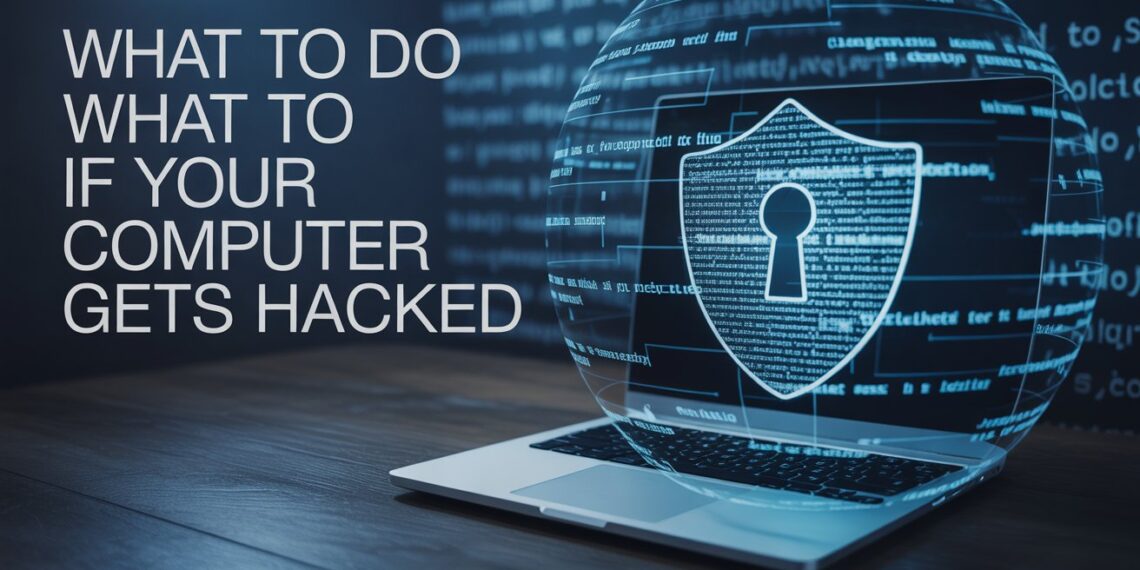In today’s hyper-connected world, cyberattacks have evolved far beyond viruses and spam emails. Modern hackers use AI-driven phishing, deepfake impersonations, and ransomware that can encrypt your entire system within minutes.
If your computer gets hacked, don’t panic but act fast. Every minute counts when protecting your personal information, finances, and identity. This 2025 guide explains how to detect a hack, limit damage, recover safely, and prevent future breaches with modern tools and strategies.
How to Tell If Your Computer Has Been Hacked
In 2025, hackers rarely make it obvious gone are the days of “You’ve been hacked” pop-ups. Instead, they silently steal your data, crypto wallets, or credentials over time. Here are the most common warning signs:
1. Unusual System Behavior
-
Sudden slowdowns or overheating even with minimal activity
-
Unknown applications running in Task Manager
-
Browser redirects or fake antivirus pop-ups
2. Unauthorized Access
-
Passwords suddenly stop working
-
Logins from unfamiliar locations or devices
-
Unrecognized transactions on PayPal, banking apps, or crypto exchanges
3. Data Manipulation
-
Files disappear or reappear unexpectedly
-
Ransom notes demanding payment in cryptocurrency
-
Webcam light turns on by itself (a classic remote access signal)
Expert Tip:
As of 2025, AI-driven malware can mimic legitimate system files and evade detection for weeks. Use behavioral analysis tools like Microsoft Defender Smart Protection or Bitdefender GravityZone to spot subtle activity changes, not just known signatures.
What to Do Immediately After Your Computer Is Hacked
Step 1: Disconnect and Contain
-
Unplug the Internet: Turn off Wi-Fi or physically disconnect Ethernet to stop data transmission.
-
Remove External Drives: Prevent malware from spreading to backups or USBs.
-
Switch to Another Device: Use a clean computer or phone to change critical passwords (bank, email, work).
Why it matters:
Hackers often maintain live control sessions. Cutting off their connection limits further damage and data theft.
Step 2: Assess the Extent of the Attack
Check what’s affected:
-
Are your accounts locked?
-
Is ransomware demanding payment?
-
Are files missing or encrypted?
Run offline antivirus scans using a trusted USB rescue drive such as:
-
Bitdefender Rescue Environment
-
Kaspersky Rescue Disk
-
ESET SysRescue Live
These work outside of Windows, detecting rootkits or deep-level infections that normal antiviruses may miss.
Option A vs Option B:
-
Offline Scans: Best for root-level or ransomware infections.
-
Online Scans: Quicker, but risk reactivation of malware during scanning.
Step 3: Remove Malware or Reinstall the OS
Once you’ve scanned your system:
-
Quarantine or delete infected files.
-
If system files are compromised, reinstall your OS (Windows 11 or macOS Sonoma recovery options in 2025 are faster and encrypted by default).
Before reinstalling:
-
Back up essential files to an external encrypted drive (not cloud it may sync infected files).
-
Note serial numbers or license keys.
Expert Insight:
Cybersecurity experts now recommend “digital clean installs” at least once every two years. This eliminates hidden vulnerabilities that accumulate from outdated drivers, plugins, and registry errors.
Step 4: Change All Passwords and Enable MFA
After securing your system, update every account password especially:
-
Email
-
Cloud storage
-
Banking
-
Social media
Use strong passphrases (e.g., River$unSky!2025) and enable Multi-Factor Authentication (MFA) via:
-
SMS or authenticator apps (Google Authenticator, Authy)
-
Hardware keys (YubiKey for maximum protection)
Step 5: Run Damage Control and Notify Affected Parties
If you use your computer for business:
-
Inform clients or team members that your system was compromised.
-
Rotate all API keys, access tokens, and database passwords.
-
Review your recent emails or messages for suspicious sent activity.
If financial data was exposed, immediately contact your bank’s fraud department and freeze your cards.
You can also report the incident to local cybercrime authorities or the FBI’s IC3 (for U.S. users).
Offline vs Online Hacking (2025 Comparison)
Type |
How It Happens |
Common Targets |
Prevention |
|---|---|---|---|
Online Hacking |
Phishing, ransomware, infected links |
Bank accounts, personal data |
Use firewall, VPN, and updated browsers |
Offline Hacking |
USB attacks, insider theft |
Local files, private documents |
Password-protect BIOS, encrypt drives |
Expert Note:
As of 2025, USB-based “plug-and-play” attacks are resurging through modified charging cables. Always use trusted hardware and disable auto-run features.
Prevent Future Attacks: 2025 Cybersecurity Best Practices
-
Keep Everything Updated
Enable automatic OS and browser updates. Zero-day exploits are patched faster in 2025 than ever before but only if updates are installed. -
Use AI-Based Security Tools
Tools like CrowdStrike Falcon, Norton Genie, and Microsoft Defender AI now detect behavior anomalies in real time rather than relying on virus signatures. -
Encrypt Everything
Use BitLocker (Windows) or FileVault (Mac) to encrypt your drives. This makes stolen hardware nearly useless. -
Regular Backups
Automate backups using offline or hybrid cloud storage. Test restoration every few months. -
Be Cautious with Public Wi-Fi
Hackers can still intercept traffic. Always use a VPN like ProtonVPN or NordVPN for secure browsing.
People Also Ask
Q: What’s the first thing to do when your computer is hacked?
Disconnect from the Internet immediately to stop further data transmission or remote control.
Q: Should I pay a ransomware demand?
Never. Payment doesn’t guarantee recovery and may mark you as a repeat target. Use professional recovery services instead.
Q: Can hackers access your webcam or microphone?
Yes. Cover your webcam when not in use and check microphone permissions in Windows or macOS privacy settings.
Q: How can I tell if someone is remotely accessing my PC?
Watch for active sessions under Task Manager → Users (Windows) or System Preferences → Sharing (Mac).
Conclusion
Getting hacked in 2025 is no longer rare but your response determines the outcome. Acting within minutes can save your identity, money, and digital life.
-
Disconnect immediately.
-
Scan with offline tools.
-
Change passwords and enable MFA.
-
Stay proactive with AI-driven cybersecurity and regular updates.
Prevention is still the best defense but with today’s smarter tools and security systems, digital resilience is more achievable than ever.









